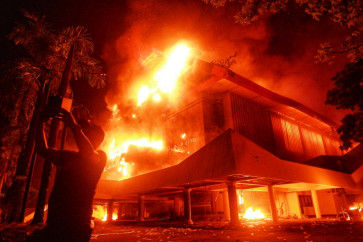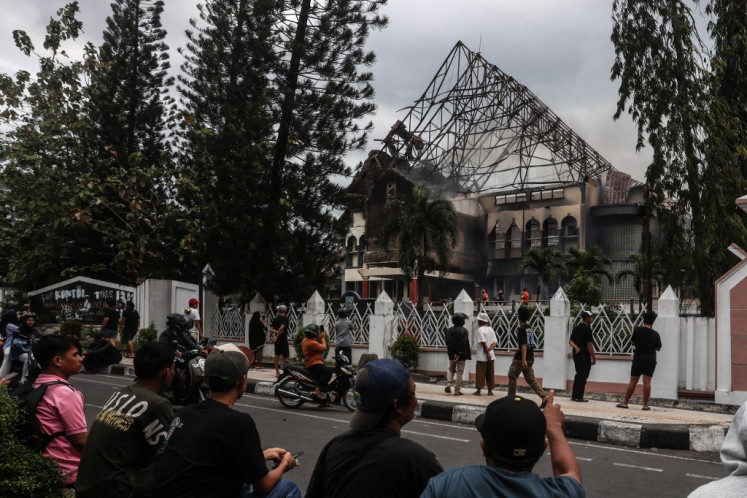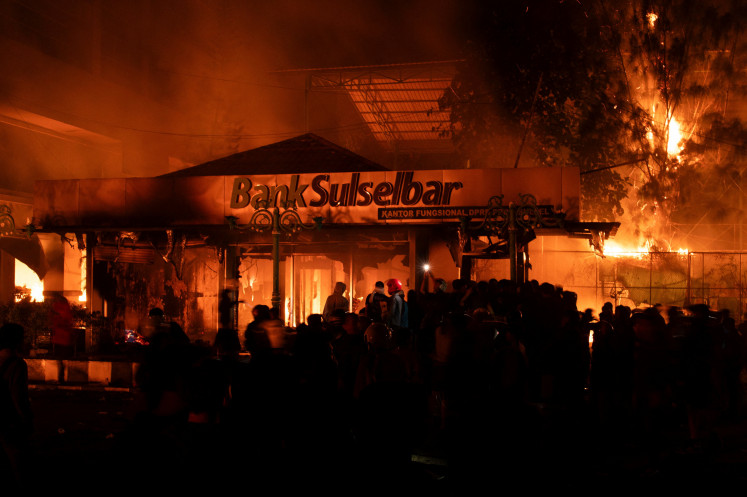Popular Reads
Top Results
Can't find what you're looking for?
View all search resultsPopular Reads
Top Results
Can't find what you're looking for?
View all search resultsThe political economy of peatland restoration
Last week an investigative team from the Environment and Forestry Ministry was ambushed as it investigated fire-ravaged concession lands in Rokan Hulu, Riau
Change text size
Gift Premium Articles
to Anyone
L
ast week an investigative team from the Environment and Forestry Ministry was ambushed as it investigated fire-ravaged concession lands in Rokan Hulu, Riau.
Later, a team from the Peatland Restoration Agency (BRG) was prevented by security staff from the Riau Andalan Pulp and Paper (RAPP) company from conducting an inspection to collect data on the opening of new peatlands and the construction of canals as reported by the local community.
This confrontational dynamic can be traced back to 2015. At the Paris Climate Summit in December 2015 (COP21), President Joko “Jokowi” Widodo in an important part of his opening address outlined his plan to reduce emissions by revamping the management of forests and land use.
Identifying the exploitation of forest peatlands as the source of most of the devastating forest fires, he promised a moratorium and a review of permits on peatland use.
This bold promise was heard around the world and raised expectations among nations committed to battling climate change and forest fires that had reached epic proportions by 2015, the first year of President Jokowi’s watch.
When the BRG was formed the international response was convincing. Donor countries that had long been staunch supporters of the Indonesian environmental effort pledged contributions.
Implementation of these financial commitments is now a major challenge for Indonesia.
Legal and political frameworks must be readied to accept and take responsibility for incoming funds for peatland restoration.
This is now today’s challenge in the political economy of peatland restoration. The technical issue is clear and steps as well as options are being formulated. The political and economic reality has to be made clear to all players, including corporations that are perpetrators of the annual forest fires.
President Jokowi has repeatedly insisted that there are no separate visions among the ministries. There is only one vision and that is the presidential vision.
That is the vision articulated at COP21 and this should be the gist of a first-year report at COP22 in Marrakech, Morocco.
There are many cause-and-effect scenarios but they all start in the peatlands and end in fires or their avoidance.
Many institutions are involved and most of the world’s media is keeping a watchful eye. The first positive signs appeared in the international news broadcast of Channel News Asia in late August, when
they reported that the hot spots in Riau province had been brought under control.
The BRG has recently passed the half-year mark since its launch by President Jokowi last January. The BRG has not become the household name it deserves to be as the new hope in reducing Indonesia’s
forest fires.
The fires are the regular result of policies carried out to ensure continuing growth and profits for huge plantations that still wish to expand their territory. The costs are very high for the public at large.
Forest fires facilitate the expansion of plantation lands to produce high-margin products such as palm oil and acacia-based wood.
Analysis by the Center for International Forestry Research (CIFOR) examined data across four districts in Riau province. CIFOR found that 85 percent of the cash was distributed to local officials and business elites and to plantation developers.
In the absence of preventive action, plantation expansion (especially on peatland) continues. It incurs domestic and regional losses that create a global impact affecting many more people than the elites who benefit.
The World Bank estimated that the 2015 fires cost Indonesia at least US$16.1 billion, which is more than twice the reconstruction cost following the Aceh tsunami.
This includes the impact on agriculture, forestry, trade, tourism and transportation and the short-term effect of the fires on health and school closures.
Other costs incurred include those of emergency responders and fire suppression as well as costs to the environment.
President Jokowi has vowed to impose sanctions on local military and police chiefs who are unable to control the spread of land and forest fires in their jurisdictions.
The President’s call should not be used by the government security apparatus to criminalize any and all people who burn land as part of the time-honored tradition of preparing land for new crops.
Field personnel must be trained to distinguish between this traditional burning and the cynical burning operations of big plantation companies to expand their territories.
Peatland restoration is important but not everything. A long-term commitment to sustainable land management is needed. This means taking action to improve the governance and management of land and natural resources.
Land boundaries must be clearly defined. Land use options must be recognized and their trade-offs balanced among competing users. Important consideration must be given to tenure and use rights with a focus on local communities and adat (customary) traditions.
All should be supported by a strong regime of spatial planning and licensing procedures.
Institutions, policies and incentives across horizontal and vertical lines of government should be oriented to sustainable land management.
__________________________________________
The writer is founder of Intermatrix Communications, which advises the civil society group Indigenous People’s Alliance of the Archipelago (AMAN).










